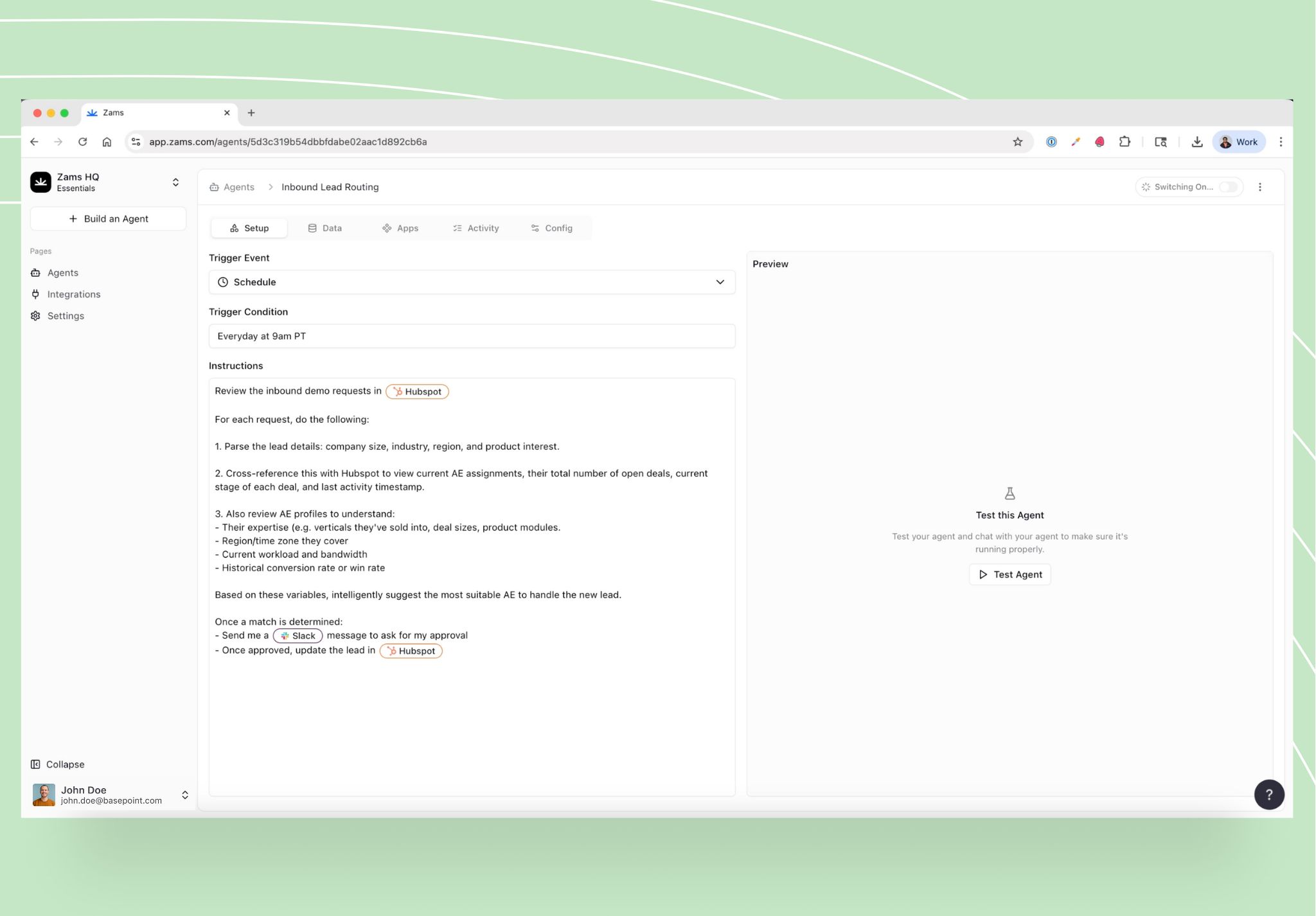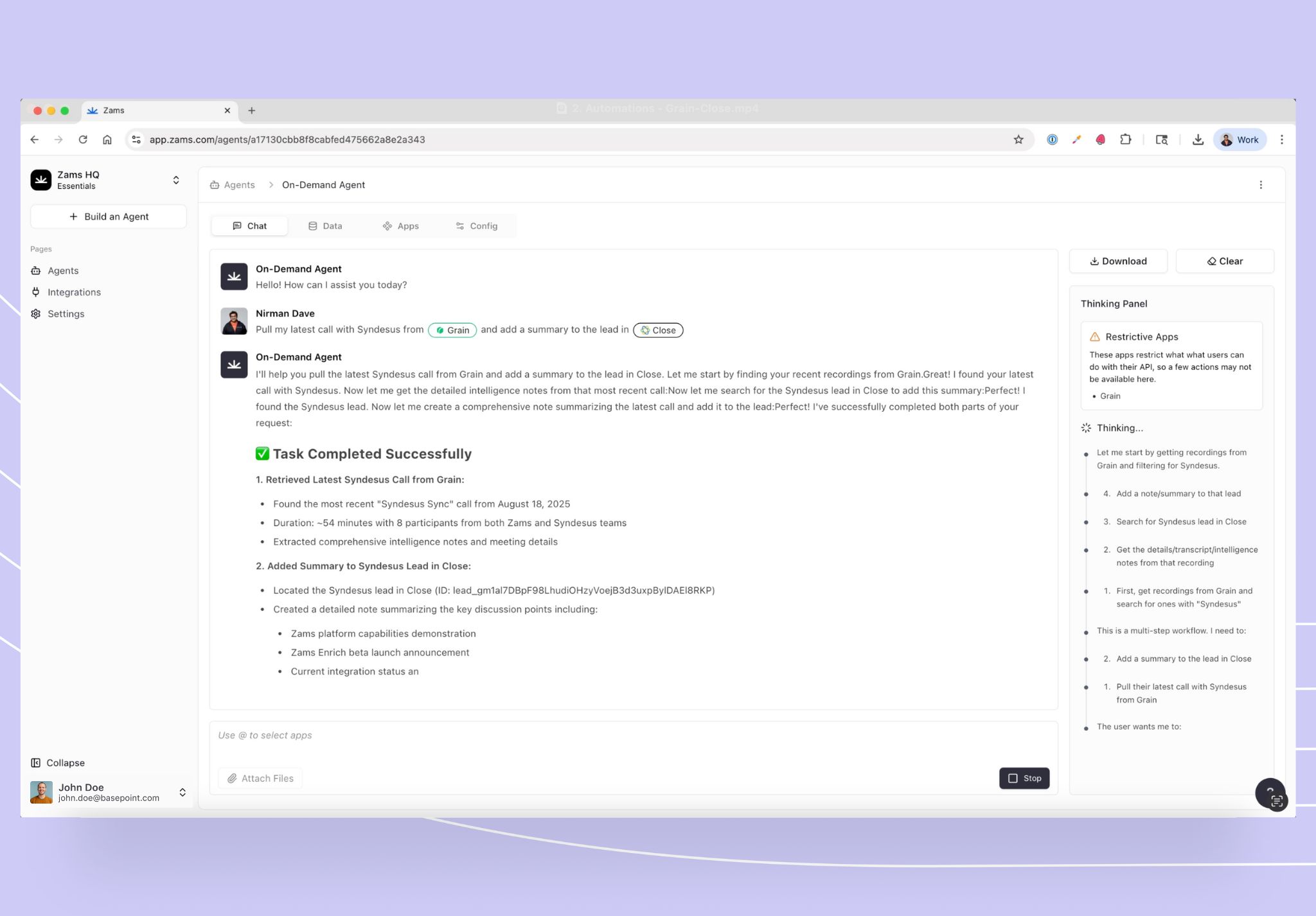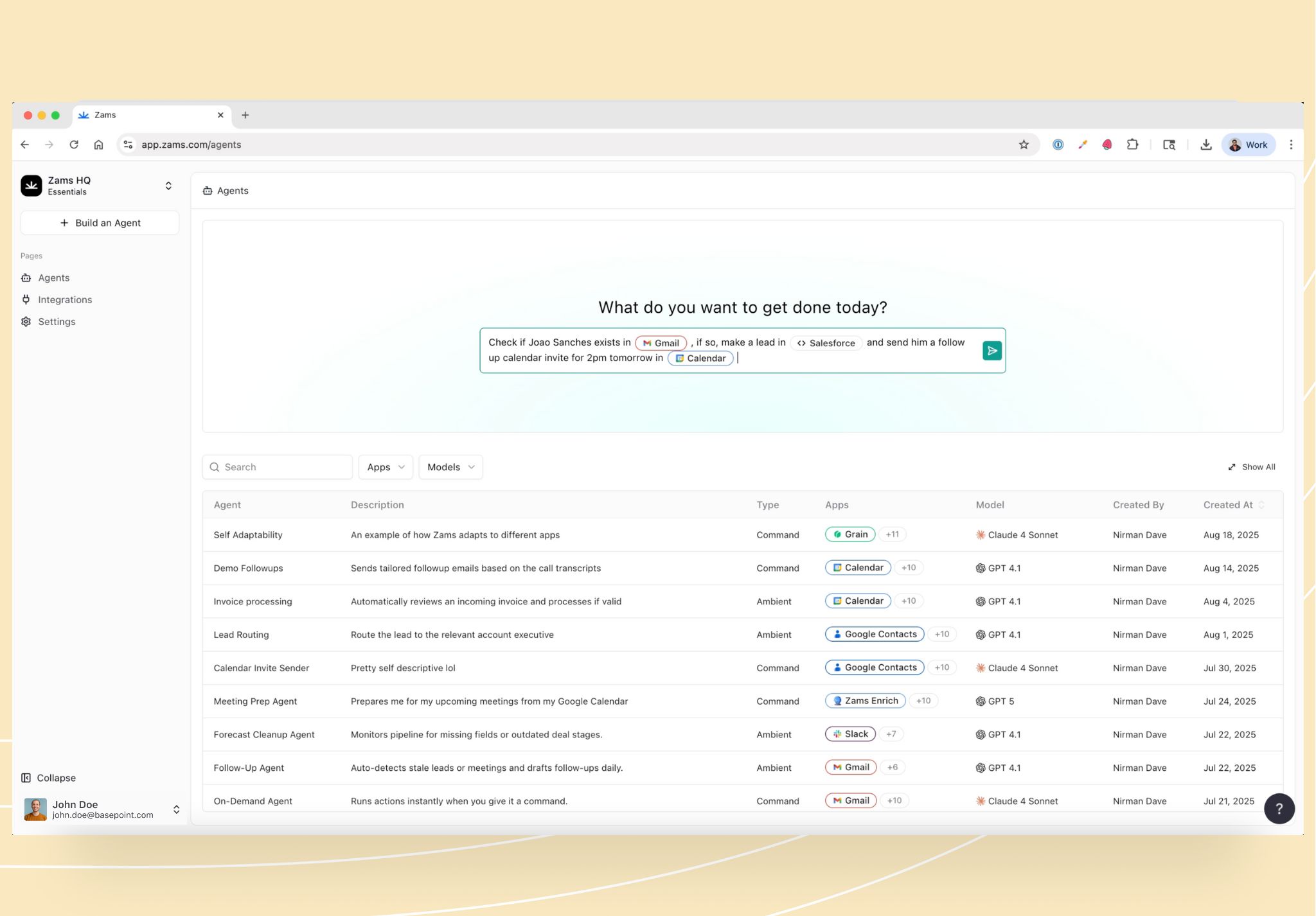The Revenue Drain No One Talks About
The hidden cost of ghosted and stalled opportunities from human error
Every stalled opportunity isn’t just a slow deal, it’s hidden revenue bleeding out of your pipeline. Without automated AI to surface risks early, leads go silent and reps waste time chasing prospects that will never convert.
Why outdated CRMs fail to protect pipeline velocity
Every stalled opportunity isn’t just a slow deal, it’s hidden revenue bleeding out of your pipeline. Without automated AI to surface risks early, leads go silent and teams waste cycles chasing prospects that will never convert.
How admin work steals time reps should spend closing
Revenue teams spend hours buried in admin, manual data entry, call logging, updating deal stages, instead of advancing conversations. An automated sales system slashes these time-consuming tasks, giving teams back the hours they need to focus on revenue-driving work.
Stop Losing Millions to Stalled Deals
Zams is the AI command center that keeps every deal moving forward, with follow-ups automated, data clean, and pipeline leaks sealed before they cost you revenue, cutting manual work by up to 80%.

Automated Sales CRM Software: The New Baseline
What is sales automation software really solving?
Sales automation removes the busywork that slows teams down. Automated lead routing, follow-ups, and pipeline updates keep your team focused on selling - not clicking. With workflows handling the grunt work, deals move faster and manual effort drops by up to 80%.
Types of Automation Tools: From Simple Triggers to Full-Funnel Orchestration
Sales automation tools come in many forms, each designed to streamline different aspects of the sales process. At the most basic level, simple triggers automate routine actions think of sending a follow-up email after a demo or instantly assigning a new lead to the right sales rep. These quick wins eliminate manual tasks that slow down sales teams and ensure nothing falls through the cracks.
On the other end of the spectrum, full-funnel orchestration tools automate entire sales processes from lead generation to deal closure. These advanced sales automation platforms integrate CRM software, marketing automation, and workflow automation to create a seamless sales funnel. With just a few clicks, sales teams can automate lead nurturing, pipeline updates, and even contract management, freeing up valuable time for high-impact selling.
By leveraging the right mix of sales automation software, marketing automation, and CRM software, sales teams can reduce administrative overhead, accelerate lead generation, and optimize every stage of the sales funnel. The result? More deals closed, less time wasted, and a sales process that scales with your ambitions.
Benefits of Sales automation CRM's that prevent costly leaks
Lead management is a core feature of sales automation CRM platforms, helping organize, score, and nurture potential customer leads to prevent costly leaks. From AI-driven lead scoring to automation features that streamline follow-ups and task assignments, these systems ensure no lead is forgotten, every action is tracked, and pipeline health is continuously protected. Automatically updating customer data within the CRM ensures accuracy and prevents missed opportunities.
Why an automated sales system creates predictable growth
Predictable growth comes from consistency. Automated sales CRM software enforces standardized workflows, ensures timely follow-ups, and delivers clean data for accurate forecasting. Instead of reactive selling, teams move with a repeatable rhythm that scales, supporting a data-driven sales strategy that grows with your business.
From Guesswork to Revenue Precision
Real-time visibility across the pipeline
Automated sales CRM software replaces guesswork with full visibility. Sales CRO's can see every stage of the sales pipeline in real time, spotting risks, tracking velocity, and forecasting with confidence instead of relying on outdated reports.
Automating lead assignment and instant follow-ups
With sales automation CRM features, leads never sit idle. Automation helps qualify leads by evaluating their readiness and assigns them to the right rep instantly, while automated follow-ups keep momentum alive, ensuring no opportunity goes cold due to delays or oversight.
Sales automation in CRM as the backbone of alignment
Automation aligns marketing and sales processes, as well as customer success, on a single system of truth. By using sales automation in CRM as the backbone, teams eliminate silos, reduce handoff errors, and keep the entire revenue engine moving in sync.

The Power of Data in Automated Sales
Data is the engine that powers effective sales automation. With high-quality customer data at their fingertips, sales teams can automate everything from lead scoring to sales forecasting, making every interaction more targeted and impactful. Sales automation software uses this data to trigger personalized email sequences, prioritize leads, and provide real-time insights that help sales reps focus on the most promising opportunities.
By analyzing customer data, CRO's can spot trends, identify bottlenecks in the sales process, and measure the true benefits of sales automation tools. Automation software also enables smarter lead scoring, ensuring that sales reps spend their time on prospects most likely to convert. Ultimately, data-driven automation empowers sales teams to make faster, more informed decisions, driving higher productivity and predictable revenue growth.
Importance of Customer Data: Fueling Smarter Sales Decisions
Customer data is the foundation of every successful sales automation strategy. By capturing and analyzing detailed information about customer behavior, preferences, and purchase history, sales teams can deliver highly personalized experiences that boost customer satisfaction and loyalty. This data-driven approach allows Head of sales to forecast sales with greater accuracy, allocate resources more effectively, and adjust sales strategies in real time.
With robust customer data, sales teams can quickly identify new opportunities, anticipate potential roadblocks, and tailor their outreach to meet each prospect’s unique needs. The result is smarter sales decisions, more efficient sales processes, and a competitive edge that drives consistent revenue growth.
Importance of Lead Scoring and Generation: Prioritizing What Matters Most
In a world where sales teams are inundated with leads, prioritization is everything. Lead scoring assigns value to each prospect based on their engagement, fit, and readiness to buy, allowing sales reps to focus on the leads most likely to convert. Meanwhile, lead generation ensures a steady flow of new opportunities into the sales funnel through channels like content marketing, social media, and paid campaigns.
Sales automation tools streamline both lead scoring and generation, reducing manual tasks and boosting sales productivity. By automating these critical steps, sales teams can quickly identify high-potential leads, nurture them with targeted outreach, and move them efficiently through the sales funnel. The result is a more productive sales process and a pipeline filled with qualified, conversion-ready prospects.
Platforms That Scale With Ambition
Non-negotiables in sales automation platforms
Not all sales automation platforms are created equal. To scale effectively, businesses need systems with flexible workflows, AI-driven insights, and customizable reporting that grows with the pipeline instead of slowing it down.
Why sales automation services beat piecemeal tools
Piecemeal tools create more complexity, not less. Sales automation services provide an integrated foundation that handles contact management, prospecting, follow-ups, and forecasting within one streamlined environment, removing the friction of disconnected systems.
Integrations that turn CRMs into true revenue engines
The best automated sales CRM software connects seamlessly with calendars, email, data enrichment, and analytics platforms. These integrations transform CRMs from static databases into living revenue engines that actively drive deal flow by ensuring all teams work from the same data, which improves coordination and decision-making.

Converting “Almost” Deals Into Closed-Won Revenue
Automated nudges that re-engage stalled leads
An automated sales CRM software sends timely nudges, from reminder emails to task prompts as part of automated customer communications that bring stalled opportunities back to life. These proactive touches keep leads engaged and prevent deals from slipping through the cracks.
AI-powered sales automation systems that shorten cycles
AI-powered sales automation systems, driven by artificial intelligence, predict buyer readiness and surface the right next action for reps. By leveraging automated workflows to streamline outreach and follow-up at peak intent, cycles shrink, and prospects move from “almost” to closed-won faster than ever.
Role of Automation in Customer Interactions: Personalization at Scale
Today’s buyers expect personalized communication at every stage of the customer journey. Sales automation tools make it possible for sales teams to deliver this level of personalization at scale. By automating routine tasks like data entry, lead qualification, and follow-up emails, your sales team can focus on building genuine relationships and understanding each customer’s unique needs, instead of wasting time on repetitive tasks.
Automation software analyzes customer data to identify patterns and predict future behavior, enabling sales teams to tailor their messaging and timing for maximum impact. This approach not only enhances customer interactions but also drives higher engagement and conversion rates. With the right sales automation tools, sales teams can deliver the personalized experiences that set them apart in a crowded marketplace without sacrificing efficiency or productivity.
Proof that ROI from sales automation software pays for itself
The impact is clear: shorter cycles, higher conversions, and revenue forecasts that actually hold up. Automated sales CRM software consistently proves its ROI by turning what were once sunk costs into measurable gains, while helping sales teams save valuable time through streamlined processes and reduced manual effort.
Building a Future-Ready Sales Stack
Aligning automated sales CRM software with revenue goals
Technology isn’t valuable unless it drives revenue. Head of sales rely on automation to meet revenue goals. Aligning automated sales CRM software with quota targets and pipeline milestones ensures every automation decision contributes directly to growth.
Customisation and scalability for evolving B2B teams
As B2B teams expand, rigid systems fail. Modern sales automation CRM platforms offer customisation and scalability, adapting workflows, integrations, and reporting to match evolving sales strategies, and often provide custom pricing to fit evolving business needs.
Connecting CRMs, marketing, and sales automation platforms seamlessly
The most powerful stacks eliminate silos by connecting CRMs with marketing automation and other sales platforms, enabling marketing teams and sales to collaborate more effectively. When systems share data seamlessly, the result is one unified engine that drives predictable, repeatable revenue.
Final Thoughts
Stalled deals and pipeline leaks aren’t just inefficiencies they’re million-dollar mistakes. Automated Sales CRM software turns chaos into clarity, ensuring teams spend less time on admin and more time closing. With automation driving follow-ups, assignments, and forecasting, your team builds a revenue engine that doesn’t miss a beat.
Equip Your Sales Team With Zams + Your Automated Sales CRM Software
Zams isn’t just another connector. It’s the AI command center that runs your entire sales stack - automating follow-ups, answering reporting questions in plain English, and keeping every deal moving forward, cutting manual work by up to 80%.
FAQ
What is sales automation software and why is it important?
Automated Sales CRM Software, also known as sales automation CRM, is designed to streamline repetitive sales processes such as data entry, lead scoring, and follow-ups. Sales automation software automates sales tasks like making and recording phone calls, sending personalized email templates, and managing lead score to help identify and prioritize qualified leads. Unlike traditional CRMs, this type of sales automation software ensures your team spends less time on admin tasks and more time closing deals, boosting pipeline velocity.
How does Automated Sales CRM Software prevent revenue leaks?
An automated sales system eliminates costly gaps in the pipeline by automatically assigning leads, triggering follow-ups, and updating deal stages in real time. By using sales automation in CRM, teams ensure no opportunity is ghosted or stalled, preventing the hidden revenue drain that slows growth. Automation also ensures accurate pricing details are always up to date in deal records and streamlines customer onboarding, reducing errors and delays that can lead to revenue leaks.
What are the must-have features in sales automation CRM?
The best sales management systems and platforms include real-time pipeline dashboards, AI-powered deal prioritisation, automated lead routing, and deep integrations. Many top platforms also offer a free plan with limited features, as well as a free trial, allowing users to test the platform before committing to a paid plan. When paired with sales automation services, these features transform CRMs into revenue engines that align sales, marketing, and operations.
How does automation impact sales rep productivity?
Sales automation platforms cut down manual admin work, giving reps back hours each week. Automated sales CRM software handles routine tasks like follow-up emails and meeting scheduling, enabling sales teams to focus on high-value conversations that directly accelerate the closing of sale opportunities.
Can sales automation software really deliver ROI?
Yes. Sales automation systems consistently show ROI by reducing cycle times, increasing win rates, and improving forecasting accuracy. Companies using the best sales automation software report more predictable revenue and scalable growth, proving that sales automation solutions quickly pay for themselves.



